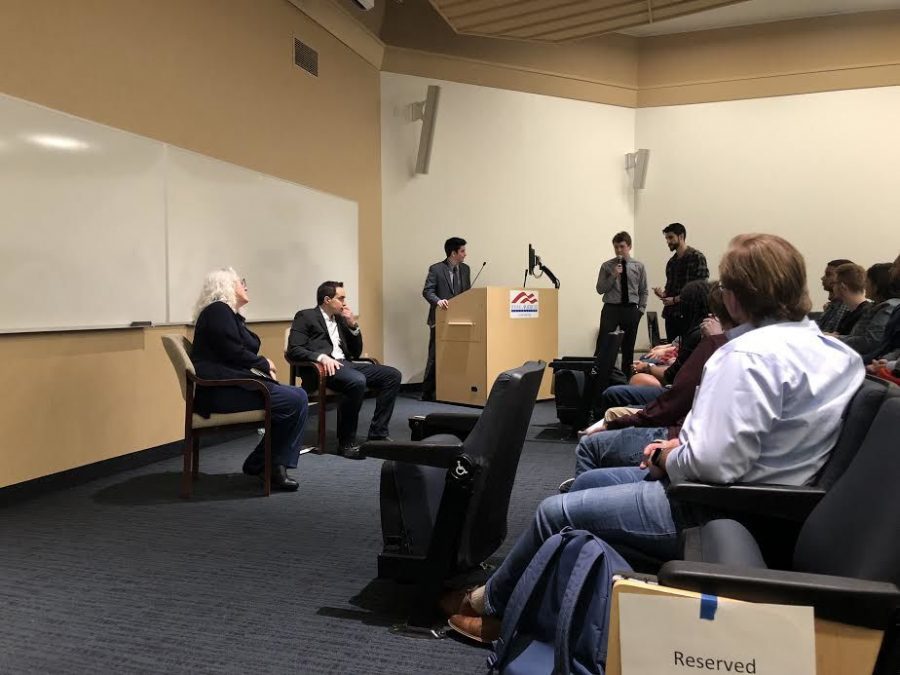College Republicans present Jason Mattera: RWU alum and conservative political activist sparks lively debate on campus
“How the Left Creates a Campus Full of Whiny Victims” — a phrase on event flyers that caught the eyes of many students this past week.
The university’s chapter of the College Republicans hosted New York Times Bestselling Author and RWU alum Jason Mattera Wednesday night in CAS 157. This was the title of his talk.
Mattera is an Emmy-nominated journalist for his work on “Crime Watch Daily” and is a conservative political activist. He graduated from RWU in 2005. His political experience took flight during his time at the university, in which he founded its chapter of the College Republicans.
A large part of Mattera’s speech revolved around gender and sex. He told the crowd that these concepts are thought of much differently now, in comparison to the way that they were considered during the years when he attended RWU.
“You see when I was a student, there were only two genders. Today’s number of genders has spiraled to a whopping 58 and counting,” he said.
Mattera referenced different gender-based terms, such as pangender, trigender, agender and other phrases. He commented that trigender means a person who can adopt multiple genders all at once and expressed his thoughts about it.
“It’s a social justice superpower. I’m all genders bro,” he said. “Think of it this way, trigender or pangender is like being the swiss army knife of genders.”
Mattera also mentions a Huffington Post article entitled “Here’s What It’s Like to Get Your Period When You’re Not a Woman.” He pinpoints a quote within the article, where author Cass Bliss comments about “navigat[ing] the challenges of getting [a] period every month in a world that refuses to acknowledge that not everyone who gets their period is a woman.”
Mattera then provided commentary on Bliss’ quote.
“Bottom line: The next time your male friend is in a bitchy mood, ask him if he’s getting his period,” Mattera said.
During the Q&A session, a student questioned why Mattera would “resort to crude and degrading jokes,” using the terms “menstruation” and “being bitchy,” which the student commented was disrespectful to women. In his response, he referenced The Huffington Post again, saying that the publication released an article which said that a man can get a menstrual period:
“It is an absurdity, it is preposterous. It’s not me being crude, it is just regurgitating the absurd nature of the rhetoric that they have,” Mattera said.
Following discussions on gender, the concept of social justice was Mattera’s next area of focus. He referenced the university multiple times while talking about this in his initial speech, taking into perspective programs such as the P.E.A.C.E Program and the Summit for Diversity and Inclusion.
“The climate fostered on campus by social justice adherence is the exact opposite of diversity and inclusion, the two buzzwords that RWU’s administration slurps with Pavlov like predictability,” Mattera said.
He said that “the university goes out of its way to marginalize Christian and conservative views.” Mattera emphasized a need for “intellectual diversity,” a diversity of perspectives, which he said should “dwarf every other type of competing diversity agenda.”
Another student questioned the reasoning behind the “Whites Only” scholarship that came about through the College Republicans under Mattera’s leadership in 2004. The scholarship no longer exists at RWU, but at the time, it garnered national media attention. Mattera said that creating this scholarship was “to undermine racial preferences,” in terms of their usage in the process of students earning monetary awards.
He described growing up in a poor Latino area, being the first in his family to go to college. Mattera said that despite these circumstances, his parents never gave him the idea that “there is some prevailing person or structure in society that is keeping [him] down.”
“In 2019, the student, regardless of color, at an American university has every resource available… the course of action is not to grouse about someone’s better circumstances. [The scholarship] was satire, it wasn’t a serious proposal, it was to point to what is the immorality of racial preferences,” Materra said. “I agree, [the scholarship] is mean-spirited, it’s divisive, but it’s done on a much larger scale by the university where they are privileging one group of people over the other.”
Students stuck around after the event ended to chat about their thoughts on what Mattera had to say and how they felt about him coming to campus.
“I thought his speech was meant to rile people up. I also have a lot of questions as to why he doesn’t think he benefits from white privilege as a white Latino,” junior Lucy Lawlor said. “I think him being here was a good way to engage in conversation as to what we don’t want on campus.”
“Overall, I thought it was really healthy to have a view on campus that isn’t really widely represented. I feel as though the Republican and conservative views are somewhat suppressed here on campus, by just the system in general,” freshman Cody Orgettas said. “I feel like it was healthy to bring in those views to promote talks between Democrats and Republicans.”
In an interview with The Hawks’ Herald, Mattera was asked about what he thought would be the best way for a university to address the concept of race-based scholarships, if strategies such as a “whites only scholarship” do not remain established in the way that scholarships for minority students do.
Mattera was also asked what his advice would be for conservative students who want to follow in his footsteps, even if backlash presents itself regarding their political views.
“Push ahead. It’s good leadership building principles to convey ideas in what may be hostile environments…don’t focus on distractions like microaggressions, safe spaces or a privilege of a particular person. You just set yourself up for some grievance and failure,” Mattera said.
Mattera attested to the value of having dialogues similar to those of last night at a university, where different opinions are discussed in a setting where people are able to disagree with each other.
He notes that students should utilize their time in college to “learn as much as possible about a field [they] may be interested in or many different fields and to really maximize that time, because [they] really will never get anything like that again.”
NEW COMMENTS FROM ADMINISTRATION MEMBERS AND RWU CLUB MEMBERS
(Updated on 4/9/19)
The Hawks’ Herald is providing this update, containing comments from different individuals and groups affiliated with the university, in response to Jason Mattera’s dialogue and visit to campus on March 27.
Kalasia Richer and Nick Kafejelis | President and Vice President, College Republicans
“I think it was important that another side was shown to certain viewpoints because I feel like the campus usually takes one side and just drives with that. For us to have a speaker on campus that says pretty much a different viewpoint is healthy for education and understanding. We didn’t have him on campus to turn everyone conservative and Republican, we had him on campus because he offers a different viewpoint, and we’re not all just sitting in a group think tank. I think the school should recognize that there are people who think differently on campus and that they would like to hear different viewpoints,” Kafejelis said.
“I think too often diversity is always just related to skin color and honestly it might just be because skin color is more of an obvious thing and it’s something that the university is trying to increase. But I think most importantly is diversity of thought, because it would be a really boring world if everybody thought the same way. I think the university is doing a disservice by only giving one perspective on campus and not giving other perspectives a chance to be heard. Because we’re in college and this is a time where you’re supposed to be a little uncomfortable and hear ideas that maybe you don’t agree with. But it just gives us a different perspective to keep in mind or just to hear it for the first time,” Richer said.
On the topic of Mattera’s mentioning of intellectual diversity and his comment that Christian and conservative viewpoints are marginalized on campus:
“A lot of people ask you ‘are conservatives suppressed on campus?’ Well, the simple answer is yes but that doesn’t get you anywhere, because it’s just an answer. But they’ll ask you, how can you change that? What the university can do is either talk to the College Republicans or even offer to have conservative speakers on campus. Whether they agree with them or not, it is for the benefit of the university that it allows students to be uncomfortable with different thoughts and to try to understand that there is another side out there that doesn’t agree with you. It is a poison to have a university that relies on groupthink. That does not prepare people for the world, because when they go out into the world and hear an opposing thought, they throw temper tantrums. They don’t understand and that’s the problem. Having conservative speakers on campus does benefit everyone and having liberal speakers on campus benefits everyone, because it provides a full spectrum of what’s out in the world,” Kafejelis said.
Noah Ashe | Incumbent Secretary and President-Elect, College Democrats
“Speaking on behalf of myself and not necessarily that of the club, I unequivocally condemn and abhor Jason Mattera’s divisive and offensive rhetoric. While other opposing political views need to be heard on this campus, the rhetoric used by Mr. Mattera was quite frankly ignorant, and meant to divide the campus community rather than to educate them,” Ashe said.
Dr. John King | Vice President for Student Life
“From my perspective, and I knew Jason when he was a student here, I knew some of his involvement. He’s a bright alum and he has a conservative thought process and agenda. I think it’s important to have speakers with that ideology on campus and I agree with his contention that the university does not proactively involve conservative speakers to the same degree that they invite social justice oriented or liberal speakers to campus. I agree with that.
However, I disagree that new programs such as the P.E.A.C.E program are negative influences on diversity and inclusion at the university. I believe that they are positive, they involve mentoring as well as leadership opportunities. They are centered on identity, diversity, equity and inclusion and they are helpful to our campus environment and I commend those types of initiatives and programs.
I also think, in terms of some of the other comments that were made, and it is an opinion and I respect people’s opinions. But when it comes to the issue of gender fluidity, I think that people that have the opportunity to closely know and live with or work with a student that’s in transition or questioning their gender, that that experience provides such a richer and deeper knowledge base from which to make a determination or to understand gender fluidity,” King said.
On the topic of Mattera’s mentioning of intellectual diversity and his comment that Christian and conservative viewpoints are marginalized on campus:
“My answer’s a little bit complex, in that I can understand why conservative and Christian students may feel that way, because they are underrepresented on campus. So when we think about, for instance, the experiences in which our underrepresented students from ethnic, socioeconomic, and gender identity lenses frame their experience here, they often will talk about being marginalized. I do think that the speaker made a valid point in terms of there’s not an equity in terms of representation of speakers’ ideological frameworks,” King said.
Dr. Ame Lambert | Vice President for Equity and Inclusion and Chief Diversity Officer
“The institution has core values and we will continue to work toward living those values. One of those values is to be inclusive: We welcome and value all expressions of diversity and identity, actively promote inclusion and prepare students to challenge societal norms and to thrive in a culturally diverse and global society. This includes stakeholders minoritized by systems based on their social identities and political perspectives. Mr. Mattera’s speech, at the invitation of the College Republicans, adds his thoughts on social issues to the discourse at his alma mater. College is about a meeting of minds and identities and the sharing of, and learning from different perspectives, backgrounds and beliefs.
It is fine that Mr. Mattera’s perspective does not align with mine. I have no compulsion to refute his thoughts line by line because opinions are subjective and we all have a right to them. My belief is that it is possible to have core values and intellectual diversity. Anyone engaged in equity work knows that there are differences of opinion on approach, goals and outcomes. To reduce everyone doing diversity work to clones of each other misses the point and the lively discussions and debates that occur within the field.
I will end by saying that we consider religion, which is often informed by national origin and ethnicity, to be a part of diversity, equity and inclusion work and are fully supportive of expressions of faith or lack thereof,” Lambert said.







